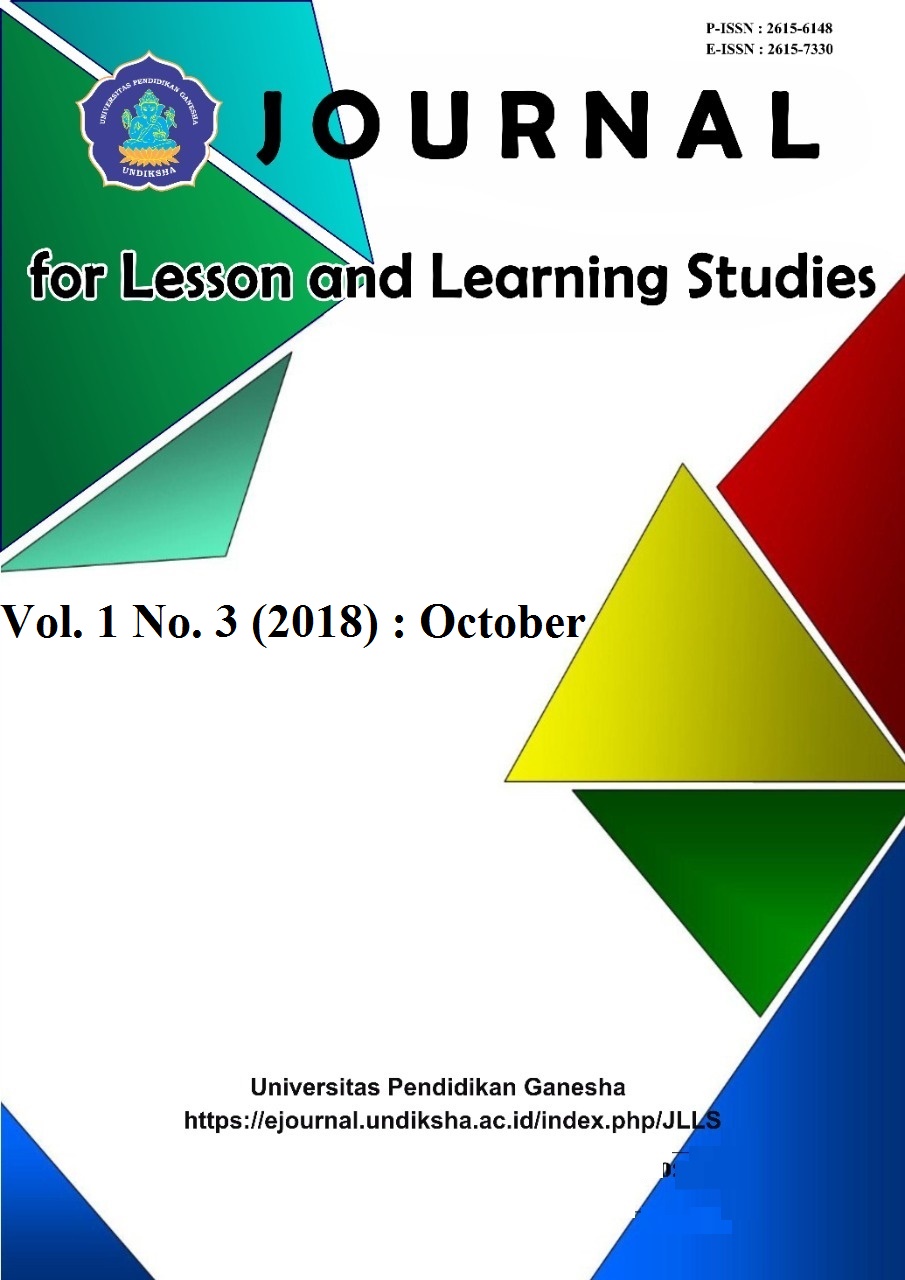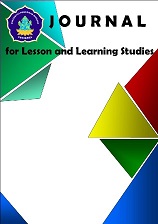PENGARUH MODEL PEMBELAJARAN INQUIRY BERBANTUAN MEDIA ANIMASI TERHADAP KOMPETENSI PENGETAHUAN IPA
DOI:
https://doi.org/10.23887/jlls.v1i3.15371Abstrak
This study aimed at determining the significant effect of science knowledge competence between groups of students who are taught by using inquary learning model which assisted by animated media with groups of students who are taught through conventional learning in fourth grade students of SD Gugus Dewi Sartika academic year 2017/2018. This study was a quasi experimental research with non-equivalent control group design. The population of this study was all fourth grade students of SD Gugus Dewi Sartika which amounted to 266 students. The sample was determined by random sampling technique so that there would be fourth grade of SD Negeri 3 Pedungan as experiment group which amounted to 45 people and fouth grade B of SD Negeri 13 Pedungan as control group which amounted to 30 people. The data collection in this research was done by the test method and the instrument used in the form of ordinary double choice objective test. Data of knowledge competence was analyzed by t-test polled variance. The analysis result indicated that there was a significant effect of science knowledge competence between group of students which was taught by using inquary learning model which assisted by animated media with group of students that was taught by using conventional learning in fourth grade students of SD Gugus Dewi Sartika academic year 2017/2018. Thus, it can be concluded that Inquiry Learning Model which assisted by animated media have a significant effect on science knowledge competence of fourth grade students of SD Gugus Dewi Sartika academic year 2017/2018, and the Inquiry Learning Model which assisted by animated media can be used in studying science so as to create the kind of learning.
Keywords : Inquiry, Animation , Science Knowledge Competence
Referensi
Agung, A.A.G. 2011. Pengantar Evaluasi Pendidikan. Singaraja: Universitas Pendidikan Ganesha.
Agung, A.A.G. 2014. Metodelogi Pendidikan. Yogyakarta: Aditya Media Publishing.
Agung, A.A.G. 2016. Statistika Dasar untuk Pendidikan. Yogyakarta: Deepublish.
Arikunto, Suharsimi. 2015. Dasar-dasar Evaluasi Pendidikan. Jakata: Bumi Aksara.
Dantes, Nyoman. 2012: Metode Penelitian. Yogyakarta: Andi Offset.
Kosasih. 2014. Strategi Belajar dan Pembelajaran Implementasi Kurikulum 2013. Bandung: Yrama Widya.
Munir. 2012. Multimedia Konsep & Aplikasi dalam Pendidikan. Bandung: Alfabeta.
Putra, I Ketut Dedi Agung Susanto. 2017. Pengaruh Model Pembelajaran Inquiry Terbimbing Berbantuan Peta Pikiran Terhadap Hasil Belajar IPA Kelas V SDI. Universitas Pendidikan Ganesha: Vol 5 No: 2.
Rasana, I Dewa Putu Raka. 2009. Model-model Pembelajaran. Sinagaraja: Universitas Pendidikan Ganesha.
Samatowa, Usman. 2010. Pembelajaran IPA di Sekolah Dasar. Jakarta: PT. Indeks.
Sani, Ridwan Abdullah. 2015. Pembelajaran Saintifik Untuk Implementasi Kurikulum 2013. Jakarta: Bumi Aksara.
Setyosari, H. Punaji. 2015. Metode Penelitian Pendidikan dan Pengembangan. Jakarta: Kencana.
Sudijono, Anas. 2015. Pengantar Evaluasi Pendidikan. Jakarta: Rajawali Pers.
Sugiyono. 2017. Metode Penelitian Kuantitatif, Kualitatif, dan R&D. Bandung: Alfabeta.
Sumantri, Mohamad Syarif. 2015. Strategi Pembelajaran. Jakarta: PT. Rajagrafindo Persada.
Suryanta, I Made. 2014. Pengaruh Model Pembelajaran Scrambel Berbantuan Media Gambar Animasi Terhadap Hasil Belajar IPA Siswa Kelas V SD Gugus Yos Sudarso Denpasar. Universitas Pendidikan Ganesha: Vol 2 No: 1.
Susanto, Ahmad. 2013.Teori Belajar dan Pembelajaran di Sekolah Dasar. Jakarta: Prenadamedia Grup.
Tabany, Trianto Ibnu Badar Al. 2014. Mendesain Model Pembelajaran Inovatif, Progresif, dan Kontekstual. Jakarta: Prenamedia Group.
Wisudawati, Asih Widi dan Eka Sulistyowati. 2014. Metodelogi Pembelajaran IPA. Jakarta: Bumi Aksara.
Unduhan
Diterbitkan
Cara Mengutip
Terbitan
Bagian
Lisensi
Authors who publish with the Journal for Lesson and Learning Studies agree to the following terms:
- Authors retain copyright and grant the journal the right of first publication with the work simultaneously licensed under a Creative Commons Attribution License (CC BY-SA 4.0) that allows others to share the work with an acknowledgment of the work's authorship and initial publication in this journal.
- Authors are able to enter into separate, additional contractual arrangements for the non-exclusive distribution of the journal's published version of the work (e.g., post it to an institutional repository or publish it in a book), with an acknowledgment of its initial publication in this journal.
- Authors are permitted and encouraged to post their work online (e.g., in institutional repositories or on their website) prior to and during the submission process, as it can lead to productive exchanges, as well as earlier and greater citation of published work. (See The Effect of Open Access)





